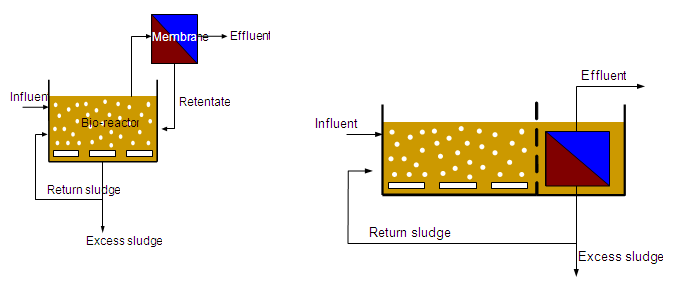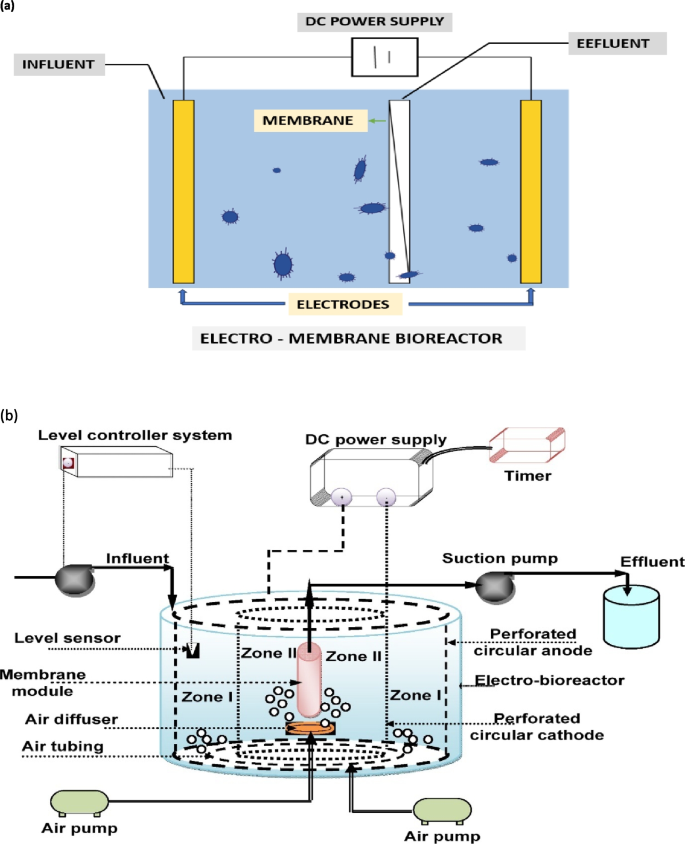Future Trends in Membrane Bioreactor Technology and Its Global Impact
Future Trends in Membrane Bioreactor Technology and Its Global Impact
Blog Article
The Advantages of Membrane Bioreactors in Lasting Wastewater Management
Membrane layer bioreactors (MBRs) stand for a crucial advancement in lasting wastewater management, effectively merging biological treatment with sophisticated membrane filtration technology. As the need for lasting remedies intensifies, exploring the multifaceted advantages of MBRs may disclose unanticipated implications for the future of wastewater treatment systems.
Summary of Membrane Bioreactors
Membrane bioreactors (MBRs) represent a substantial development in wastewater therapy technology, integrating organic destruction with membrane purification to boost the performance of the therapy procedure. This ingenious system combines the advantages of conventional triggered sludge processes with membrane layer technology, permitting improved solid-liquid splitting up. MBRs use semi-permeable membrane layers to separate cured water from biomass, resulting in premium effluent that can be recycled or securely released into the environment.
The functional design of MBRs generally entails a bioreactor where bacteria damage down natural matter, adhered to by a membrane unit that filterings system the combined liquor. This arrangement not only decreases the impact of the therapy center however additionally permits for higher biomass focus and lowered hydraulic retention times. Furthermore, MBRs can treating a larger series of impurities, consisting of nutrients and microorganisms, making them appropriate for different applications, from local wastewater therapy to commercial effluent handling.
The combination of MBRs into wastewater management systems is indicative of a growing trend in the direction of effective and lasting techniques in environmental design. Their ability to produce high-grade effluent while lessening room demands placements MBR modern technology as a vital player in contemporary wastewater treatment services.
Enhanced Effluent Top Quality

The membrane layer filtration process works as a physical barrier, making it possible for the retention of microorganisms and particulate issue, which adds to a more clear and cleaner effluent (Membrane Bioreactor). MBRs operate at higher biomass focus than standard triggered sludge systems, promoting a lot more effective biodegradation of contaminants. This results in a decrease in biochemical oxygen need (FIGURE) and complete put on hold solids (TSS) degrees in the last effluent
In addition, MBRs demonstrate outstanding efficiency in dealing with challenging wastewater make-ups, such as commercial effluents and wastewater with high nutrient lots. As a result, the effluent produced is frequently of higher quality, enabling more adaptable disposal alternatives and reduced environmental effect. Ultimately, the enhanced effluent top quality accomplished via MBR modern technology emphasizes its important duty beforehand lasting wastewater management practices.
Water Reuse Opportunities
The premium effluent produced by membrane layer bioreactors (MBRs) opens substantial chances for water reuse in various applications. MBRs properly get rid of contaminants, consisting of pathogens, suspended solids, and organic issue, causing cured water that meets or surpasses governing requirements for reuse. This high quality enables for the execution of water reusing efforts across diverse markets.
One noticeable application remains in agriculture, where dealt with wastewater can be made use of for watering, advertising sustainable farming practices while saving fresh water sources. Furthermore, MBR-treated effluent can be made use of for industrial processes such as air conditioning, cleaning, and as a procedure water source, dramatically lowering the demand for drinkable water in these operations.
In city settings, MBRs help with using reclaimed water for landscape watering, bathroom flushing, and other non-potable usages, adding to the general strength of water system systems. Additionally, the integration of MBR modern technology in decentralized systems help in handling local water demands, especially in water-scarce areas.
Decreased Environmental Effect
How can the fostering of membrane bioreactors (MBRs) contribute to a decreased environmental influence in wastewater management? MBRs dramatically improve the treatment effectiveness of wastewater while minimizing environmental disturbances. Membrane Bioreactor.
Additionally, MBRs run at lower hydraulic retention times compared to conventional systems, resulting in smaller sized treatment plant footprints. This compact style minimizes land usage, thus maintaining all-natural habitats and biodiversity. The procedure additionally produces much less sludge than standard methods, minimizing disposal challenges and reducing greenhouse gas emissions related to sludge management.
Additionally, MBRs help with the recuperation of important resources, such as water and nutrients, contributing to a circular economic situation. By enabling water reuse for watering or industrial processes, MBRs aid alleviate see this website freshwater scarcity, therefore promoting sustainable water make use of techniques. Inevitably, the adoption of MBR innovation stands for a substantial stride in the direction of lessening the environmental impact of wastewater monitoring systems.
Economic Benefits of MBRs

Furthermore, MBRs assist in the production of premium effluent, which can be recycled for different applications, such as farming irrigation and commercial processes - Membrane Bioreactor. This reuse capability can substantially decrease water procurement prices, giving a financial reward for industries encountering stringent water regulations
The small style of MBR systems also causes decreased land needs, which is particularly valuable in metropolitan areas where realty is expensive. By lessening area, sectors and communities can minimize land acquisition and upkeep costs.
Furthermore, MBRs often require less constant upkeep and have a longer life-span than traditional systems, further adding to cost savings. In summary, the economic benefits of MBRs-- ranging from lowered operational expenses to land financial savings and effluent reuse-- make them a compelling selection for Go Here lasting wastewater management, supplying both lasting and instant monetary advantages.
Final Thought
Furthermore, MBRs add to lowered environmental influences via small layouts and lower sludge generation. Economic advantages better improve their feasibility, making MBRs an appealing service for dealing with the difficulties of wastewater therapy and promoting lasting resource management.
Membrane bioreactors (MBRs) represent a pivotal advancement in lasting wastewater monitoring, properly combining organic treatment with innovative membrane filtering technology.Membrane bioreactors (MBRs) stand for a considerable advancement in wastewater treatment modern technology, integrating biological degradation with membrane layer filtering to enhance the effectiveness of the therapy process.Accomplishing improved effluent top quality is one of the most significant benefits of making use of membrane layer bioreactors (MBRs) in wastewater treatment.Furthermore, MBRs demonstrate outstanding performance in treating tough wastewater compositions, such as commercial effluents and wastewater with high nutrient tons.Integrating membrane layer bioreactors (MBRs) right into wastewater administration not just reduces ecological effect but additionally offers considerable financial benefits.
Report this page